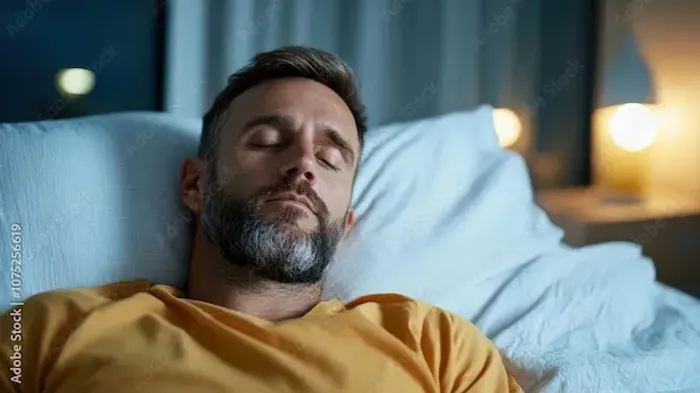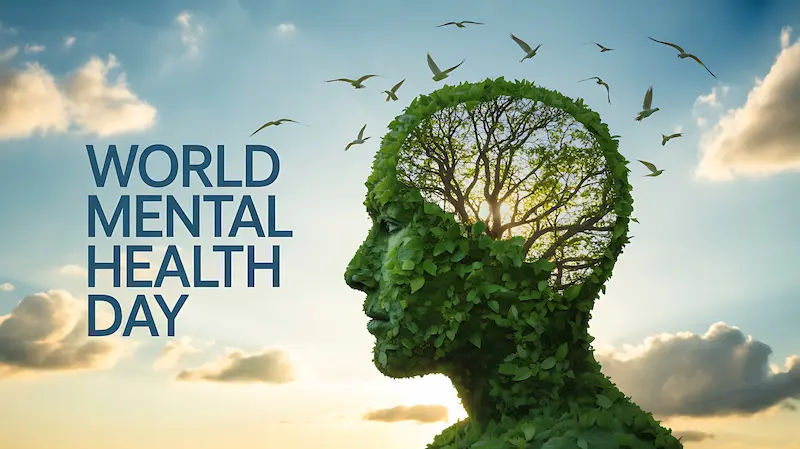Guide to How Sleep Impacts Mens Well Being
Know about the impact of sleep in mens well-being, what it is, hormones, sleep growth, metabolic, heart and vascular health and more. Learn about the recovery, commmon sleep disorders and lifestyle factors and more.

Written by Dr. Siri Nallapu
Reviewed by Dr. J T Hema Pratima MBBS, Fellowship in Diabetes Mellitus
Last updated on 13th Jan, 2026

Introduction
If you’ve ever tried to power through a week on too little sleep, you’ve felt how quickly it impacts your energy, mood, and focus. For men, the ripple effects of sleep reach even further—affecting hormones like testosterone, heart and metabolic health, sexual function, and performance at work and in the gym. The good news? Small, targeted changes can transform your nights and your days. This guide breaks down how sleep impacts men’s well-being, what quality sleep really looks like, and the steps you can take to improve it starting tonight. You’ll also find evidence-based tips, tech that can help (and hurt), and a simple 30-day sleep reset designed for men. Whether you’re tackling snoring, late-night scrolling, shift work, or stress, you’ll learn how to reclaim restorative sleep and feel your best.
Consult a top General Practitioner
Why Sleep Matters for Men’s Health
Quality sleep isn’t a luxury; it’s a biological requirement that tunes every major system in the body. Men often overlook sleep because it isn’t as visible as diet or training, but it quietly sets the stage for hormone balance, metabolism, heart function, cognition, and immunity. Most adults need at least 7 hours per night; many men perform best at 7.5–8.5 hours, especially if physically active or under high stress.
The body’s internal clock (circadian rhythm) regulates sleep timing and hormone release. Exposure to bright morning light helps anchor this clock, while late-night screens and irregular schedules push it later. Sleep quality isn’t just hours it includes sufficient deep sleep for physical repair and REM sleep for emotional processing and memory. If you wake unrefreshed, snore loudly, doze off during the day, or rely on caffeine past noon, your sleep quality likely needs attention.
Treat sleep like a training cycle. Just as you wouldn’t expect strength gains without recovery, you can’t expect consistent productivity, patience, or libido without sleep. When men begin protecting sleep with the same intent they bring to work or workouts, health markers from blood pressure to mood often improve within weeks.
Hormones and Sleep: Testosterone, Cortisol, and Growth
Testosterone follows a daily rhythm, peaking in the morning after consolidated sleep. Deep sleep and REM are particularly important for normal hormonal pulses. In a controlled study, healthy young men restricted to 5 hours of sleep per night for one week saw significant drops in daytime testosterone (10–15%), with fatigue and lower vigor reported [9]. Poor sleep also disrupts cortisol, the stress hormone higher evening cortisol can delay sleep onset and fragment sleep, creating a vicious cycle.
Growth hormone, released in early deep sleep, supports muscle repair and body composition. If strength training isn’t yielding expected gains, scrutinize your sleep pattern. Night-to-night inconsistency can blunt testosterone signaling even if weekly averages look “ok.” Aim for a regular sleep window and a calm, tech-free wind-down.
Many men focus on supplements for testosterone yet sleep is the lowest-risk, highest-impact “booster.” Before chasing exotic fixes, build a sleep foundation. If symptoms of low testosterone persist low libido, low morning energy, reduced strength—despite improving sleep for 4–6 weeks, discuss evaluation with a clinician. If symptoms persist beyond two weeks and affect daily life, consult a doctor online with Apollo24|7 for further evaluation. Related keywords: sleep and testosterone levels; REM sleep benefits for men.
Metabolic Health: Weight, Blood Sugar, and Appetite
Short sleep changes appetite hormones: ghrelin rises (you feel hungrier), and leptin falls (you feel less satisfied), pushing
you toward energy-dense snacks, especially at night. Sleep loss also impairs insulin sensitivity, making it harder to manage blood glucose and increasing diabetes risk. Over time, men who habitually sleep less than 7 hours have higher odds of weight gain, abdominal fat, and prediabetes.
Practical strategies:
- Anchor your circadian rhythm: 10–20 minutes of bright outdoor light within an hour of waking.
- Time dinner 2–3 hours before bed; keep late snacks protein-forward to tame cravings.
- Avoid caffeine after early afternoon; men metabolize caffeine variably, and “social coffees” can silently delay sleep.
- If you weight-train, schedule hard sessions earlier in the day or finish at least 3–4 hours before bed.
“sleep-first” fat loss plateau breaker this means hen fat loss stalls, try a 10-day sleep push (in bed 30–45 minutes earlier,
no screens in bed). Many men report better appetite control and renewed progress without changing calories—because better sleep reduces compensatory hunger and improves training recovery. If screening for metabolic health is due, Apollo24|7 offers convenient home collection for tests like fasting glucose, HbA1c, and lipid profile. Related keywords: lack of sleep and weight gain in men; sleep and insulin sensitivity.
Heart and Vascular Health: Blood Pressure, Rhythm, and Risk
Sleep affects the heart as directly as diet and exercise. Chronic short sleep and fragmented sleep increase risk for
hypertension, coronary artery disease, stroke, and arrhythmias [4,5]. Obstructive sleep apnea (OSA)—more prevalent in
men—is a major driver of nocturnal oxygen dips and sympathetic surges that elevate blood pressure and strain the cardiovascular system. Treating OSA with CPAP can lower blood pressure and improve daytime alertness and quality of life.
Practical steps:
- Check your risk: loud snoring, witnessed pauses in breathing, morning headaches, dry mouth, and daytime sleepiness are red flags.
- Heart-friendly sleep habits: consistent sleep-wake time, limited alcohol (especially late), and sleeping on your side if you snore.
Think of sleep as a “fourth pillar” of heart health alongside nutrition, exercise, and not smoking. Many men who do “everything else right” but neglect sleep still carry elevated cardiometabolic risk. A simple screening for OSA can be transformative. If you or your partner notice breathing pauses at night, book an online consult with Apollo24|7; a home sleep study can often be arranged to confirm diagnosis. Related keywords: sleep and heart disease risk; CPAP therapy benefits for men.
Brain and Mood: Focus, Memory, and Mental Health
Sleep supports attention, working memory, and emotional regulation. REM sleep, in particular, helps the brain process
emotions and stress. Sleep deprivation increases irritability, reduces frustration tolerance, and heightens anxiety. It also raises the risk of depression and worsens PTSD symptoms. For men, cultural pressures to “power through” can delay help-seeking and lead to self-medicating with alcohol, which further disrupts sleep.
Practical strategies:
- Keep a consistent wind-down routine: dim lights, light stretching, journaling to offload worries.
- For racing thoughts, try a “worry window” 2–3 hours before bed—write down concerns and next steps so your brain
can switch off later. - If persistent low mood, anxiety, or nightmares impact your functioning, prioritize sleep evaluation as part of mental
health care.
Men often mistake sleepiness for lack of motivation. A two-week trial of a consistent sleep schedule and morning light can clarify whether fatigue is primarily sleep-related. If mood symptoms persist for more than two weeks or you experience suicidal thoughts, seek urgent help. Consider an online evaluation with Apollo24|7 to coordinate sleep and mental health support. Related keywords: sleep and mental health in males; insomnia treatment for men.
Sexual Health and Fertility
Sleep quality correlates with libido and erectile function. Short or irregular sleep can lower testosterone and increase fatigue—two common contributors to reduced sexual interest. There’s also emerging evidence that both very short and very long sleep durations are associated with poorer semen quality and lower sperm concentration, potentially through hormonal and inflammatory pathways. Sleep apnea is linked with erectile dysfunction, likely via endothelial dysfunction and reduced nitric oxide availability.
Practical steps:
- Protect 7–8 hours of sleep most nights; address snoring and nocturnal awakenings.
- Limit late-night screens and pornography use; blue light suppresses melatonin and can delay sleep.
- If erectile dysfunction coexists with snoring or morning headaches, screen for OSA; treating apnea may improve
symptoms.
Couples-based sleep upgrades agreeing on earlier wind-down, dimming lights together, and a “no-phones-in-bed” rule—
often improve both sleep and intimacy. If fertility is a concern, discuss evaluation. Apollo24|7 offers home collection
for relevant labs (e.g., testosterone, vitamin D) and can coordinate semen analysis through partner labs. Related keywords: sleep and fertility male sperm quality; sleep apnea in men symptoms.
Performance, Recovery, and Injury Risk
From the office to the gym to the road, sleep drives performance. Athletes who extend sleep often see improvements in reaction time, shooting accuracy, and sprint performance; everyday men notice faster decision-making and fewer mistakes. Sleep is also your body’s repair window: deep sleep releases growth hormone to support muscle recovery, while REM contributes to motor learning. Sleep-deprived drivers have a markedly higher crash risk; being awake 20 hours can impair reaction time comparable to blood alcohol levels near legal limits.
Practical strategies:
- Aim for 7.5–8.5 hours on heavy training days.
- Consider a short, early-afternoon nap (10–20 minutes) if nights were short—avoid late naps that cut into bedtime.
- Stack recovery: hydrate, protein within 60 minutes post-workout, and a warm shower 1–2 hours before bed to help body
temperature drop.
Protecting sleep before high-risk tasks (e.g., long drives, heavy lifts) is harm reduction. If you can’t extend sleep the night before, a planned 20-minute nap and a 15–20 minute walk in daylight can meaningfully sharpen alertness.
Related keywords: REM sleep benefits for men; naps and performance.
Common Sleep Disorders in Men
Obstructive Sleep Apnea (OSA): More common in men, especially with snoring, neck circumference >17 inches, central weight gain, and nasal congestion. Symptoms include witnessed apneas, choking/gasping, morning headaches, and daytime sleepiness. Untreated OSA increases risk of hypertension, heart disease, insulin resistance, and mood changes.
Insomnia: Trouble falling or staying asleep at least three nights per week for three months or more. It often coexists with stress, anxiety, pain, reflux, or poor sleep habits. First-line treatment is cognitive behavioral therapy for insomnia (CBT-I), which outperforms sleep medications long-term.
Other disorders: Restless legs syndrome (urge to move legs, worse at night, relieved by movement); circadian rhythm disorders (delayed sleep phase, common in night owls); and shift work disorder (misalignment due to rotating or night shifts).
Men sometimes dismiss symptoms as “just tired.” If you have OSA red flags or persistent insomnia, early evaluation pays off. If symptoms persist beyond two weeks, consult a doctor online with Apollo24|7 for further evaluation; home sleep testing for suspected OSA is often available. Related keywords: sleep apnea in men symptoms; insomnia treatment for men.
Lifestyle Factors That Undercut Men’s Sleep
Alcohol: It may help you fall asleep, but it fragments sleep and suppresses REM, leading to early awakenings. Nicotine
is a stimulant that shortens sleep and causes nighttime arousals. Caffeine has a half-life of 5–7 hours; a 4 p.m. coffee can
still be active near midnight for some men.
Screens and blue light: Evening exposure delays melatonin release and shifts your clock later. Combine this with engaging content (news, games, social media), and your brain stays “on.”
Late training and heavy meals: Intense workouts too close to bedtime can delay sleep. Large, high-fat meals increase reflux risk and raise body temperature, making it harder to fall asleep.
Use a “reverse alarm”—set an alarm 60–90 minutes before bed to start wind-down, dim lights, and park your phone in another room. Related keywords: caffeine and sleep in men; blue light and melatonin in men.
When to See a Doctor and What to Expect
Evaluation starts with a history: sleep schedule, daytime sleepiness, snoring, awakenings, medications,
caffeine/alcohol/nicotine, and a brief mental health screen. Tools like the Epworth Sleepiness Scale or STOP-Bang can
guide OSA risk. You may be asked to keep a sleep diary for 1–2 weeks.
Testing: For suspected OSA, a home sleep apnea test may be appropriate; some cases require an in-lab polysomnogram.
Labs can include thyroid function, iron studies (for restless legs), fasting glucose/HbA1c, and testosterone if symptoms suggest deficiency. Treatments range from CBT-I for insomnia to CPAP or mandibular devices for OSA, positional therapy, light therapy for circadian issues, and targeted medications when necessary [6,7].
If your condition does not improve after trying these methods, book a physical visit to a doctor with Apollo24|7.
Apollo24|7 also offers convenient home collection for tests like vitamin D or HbA1c, and can help coordinate a home sleep study when appropriate. Related keywords: insomnia treatment for men; sleep apnea in men symptoms. Sources: [6,7]
Tools, Tech, and Therapies That Help
Wearables: Devices estimate sleep using movement and heart signals. They’re useful for trends (bedtime consistency,
total time in bed), but stage data isn’t diagnostic. Focus on behaviors rather than chasing “scores.”
CBT-I apps: Evidence-based programs teach stimulus control, sleep restriction, relaxation, and cognitive reframing.
They can reduce insomnia symptoms within weeks and are a strong first-line tool.
Light therapy and travel: Bright light boxes (10,000 lux) in the morning can advance a delayed sleep phase; blue-blocking glasses in the evening reduce light’s melatonin suppression. For travel, anchor to destination time, get outdoor light upon arrival, and time short naps strategically.
“Minimum effective tech.” Choose one tool you’ll use consistently—like a sunrise alarm or a CBT-I app—rather than juggling many. Related keywords: CBT-I for insomnia; light therapy sleep.
Myths vs. Facts About Men and Sleep
- “I can get by on 5 hours.” Fact: Most adults need 7+ hours; chronically short sleepers accumulate deficits that impair performance and health [1,3].
- “Snoring is harmless.” Fact: Snoring can signal OSA, which carries cardiovascular risk and daytime sleepiness.
- “Alcohol helps me sleep.” Fact: It shortens sleep latency but fragments sleep and reduces REM, worsening overall
quality. - “I’ll catch up on weekends.” Fact: Large swings in sleep timing can jet-lag your clock and make Monday harder. Aim
for consistency.
A 30-Day Sleep Reset for Men
Week 1: Foundation
- Set a fixed wake time and morning light routine.
- Caffeine curfew: no caffeine after 2 p.m.
- Bedroom: cool, dark, quiet.
Week 2: Consistency
- Wind-down alarm 60–90 minutes before bed.
- No phone in bed; start a brief journal to offload worries.
- Dinner 2–3 hours before bed; limit alcohol to small amounts and not nightly.
Week 3: Optimization
- Training timing: heavy sessions earlier; add 10–20 min afternoon nap if nights short.
- Add a warm shower 1–2 hours pre-bed.
- Trial blue light reduction after sunset.
Week 4: Personalization
- Identify your “best” sleep window.
- Address residual issues: snoring (side-sleeping, nasal strips), reflux (meal timing), pain (gentle evening mobility).
- If symptoms persist, schedule an online consult (e.g., via Apollo24|7) to screen for OSA or insomnia and discuss next
steps.
Conclusion
Sleep quietly powers nearly every aspect of men’s well-being—from testosterone and muscle recovery to blood pressure, weight, mood, and sex drive. The research is clear: when sleep improves, so does life. You don’t need a perfect routine to benefit; even one or two targeted changes—consistent wake time, morning light, a real wind-down—can make you feel sharper, calmer, and more resilient within days. If snoring, daytime sleepiness, or persistent insomnia are in the mix, take them seriously. Start with the 30-day reset above, then personalize what works for your schedule and goals. If your condition does not improve after trying these methods or symptoms persist beyond two weeks, consult a doctor online with Apollo24|7 for further evaluation. They can coordinate appropriate testing and treatments, and even arrange home collection for relevant labs like HbA1c or vitamin D. Better sleep isn’t a luxury; it’s your daily reset button. Guard it, and watch the rest of your health fall into place.
Consult a top General Practitioner
Consult a top General Practitioner

Dr. Rajib Ghose
General Physician/ Internal Medicine Specialist
25 Years • MBBS
East Midnapore
VIVEKANANDA SEBA SADAN, East Midnapore

Dr. Ajay K Sinha
General Physician/ Internal Medicine Specialist
30 Years • MD, Internal Medicine
Delhi
Apollo Hospitals Indraprastha, Delhi
(200+ Patients)

Dr. Sougata Kumar
General Practitioner
8 Years • MBBS
East Midnapore
VIVEKANANDA SEBA SADAN, East Midnapore

Dr. Vishal Kumar H
General Physician/ Internal Medicine Specialist
8 Years • MBBS, master class in critical care medicine, Advanced Post Graduate Diploma in Non Invasive Cardiology, certificate course in Cardiovascular Disease & Stroke, Certificate course in Common Mental Disorder
Bengaluru
Apollo Clinic, Basavanagudi, Bengaluru

Dr. Vivek D
General Physician
4 Years • MBBS
Bengaluru
PRESTIGE SHANTHINIKETAN - SOCIETY CLINIC, Bengaluru
Consult a top General Practitioner

Dr. Rajib Ghose
General Physician/ Internal Medicine Specialist
25 Years • MBBS
East Midnapore
VIVEKANANDA SEBA SADAN, East Midnapore

Dr. Ajay K Sinha
General Physician/ Internal Medicine Specialist
30 Years • MD, Internal Medicine
Delhi
Apollo Hospitals Indraprastha, Delhi
(200+ Patients)

Dr. Sougata Kumar
General Practitioner
8 Years • MBBS
East Midnapore
VIVEKANANDA SEBA SADAN, East Midnapore

Dr. Vishal Kumar H
General Physician/ Internal Medicine Specialist
8 Years • MBBS, master class in critical care medicine, Advanced Post Graduate Diploma in Non Invasive Cardiology, certificate course in Cardiovascular Disease & Stroke, Certificate course in Common Mental Disorder
Bengaluru
Apollo Clinic, Basavanagudi, Bengaluru

Dr. Vivek D
General Physician
4 Years • MBBS
Bengaluru
PRESTIGE SHANTHINIKETAN - SOCIETY CLINIC, Bengaluru
More articles from Men S Health
Frequently Asked Questions
1) How many hours should adult men sleep?
Most adult men feel and function best with 7–9 hours of sleep. Consistency matters as much as total time. Related keyword: best sleep duration for adult men.
2) Can lack of sleep lower testosterone?
Yes. Even a week of 5 hours per night can lower daytime testosterone in healthy men. Fixing sleep often improves energy and libido. Related keyword: sleep and testosterone levels.
3) What are the key signs of sleep apnea in men?
Loud snoring, witnessed pauses in breathing, gasping, morning headaches, and daytime sleepiness. If present, consider a home sleep study and consult a clinician. Related keyword: sleep apnea in men symptoms.
4) What’s the best insomnia treatment for men?
Cognitive behavioral therapy for insomnia (CBT-I) is first-line and outperforms medications long-term. If insomnia persists beyond two weeks, consult a doctor online with Apollo24|7. Related keyword: insomnia treatment for men.
5) Does improving sleep help with weight loss?
Yes. Better sleep reduces cravings, improves insulin sensitivity, and supports training recovery—making weight management easier. Related keyword: lack of sleep and weight gain in men.




